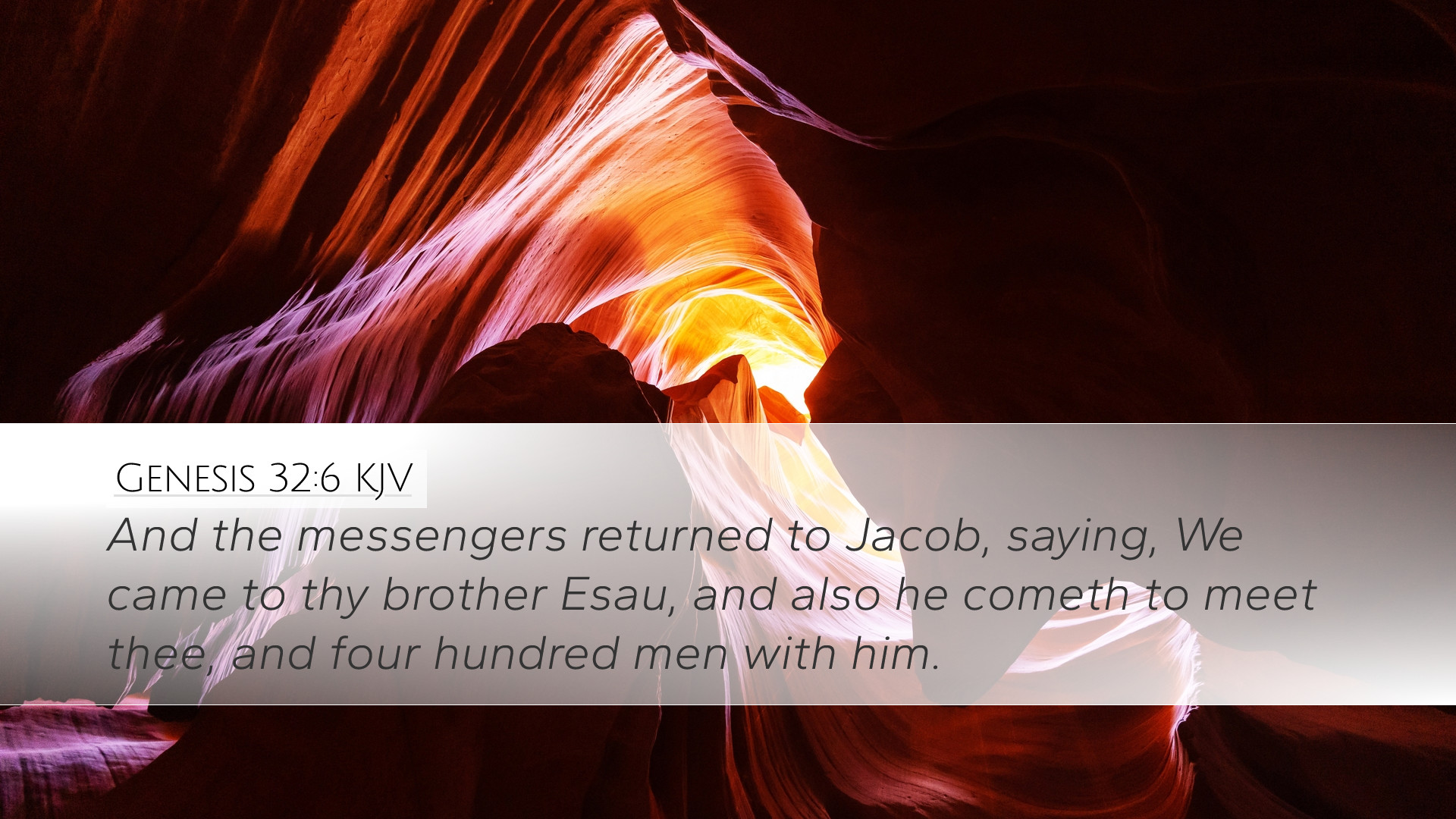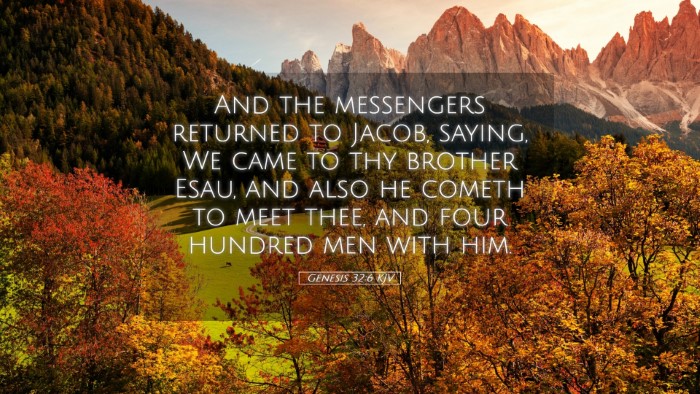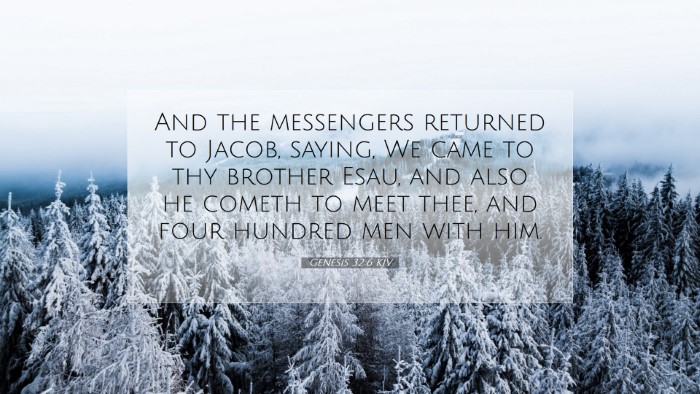Commentary on Genesis 32:6
Genesis 32:6 states: "And the messengers returned to Jacob, saying, We came to thy brother Esau, and also he cometh to meet thee, and four hundred men with him." This verse marks a pivotal moment in the narrative of Jacob's life, reflecting both his anxiety regarding his past and the unfolding of God's promises.
Contextual Overview
In the broader context of Genesis, Jacob has been separated from Esau for many years, particularly since he deceived his brother out of his birthright and blessing. Now, as he prepares to return to Canaan, he faces the reality of his past actions and their potential consequences.
Insights from Public Domain Commentaries
Matthew Henry's Commentary
Matthew Henry emphasizes the gravity of Jacob's situation. He notes that the return of the messengers with the news of Esau’s approach, accompanied by 400 men, creates a sense of dread in Jacob’s heart:
- The Presence of Esau: Henry states that Jacob’s brother coming to meet him possesses dual meanings; it might denote reconciliation or retribution. The ambiguity of Esau's intentions heightens Jacob’s fear.
- Symbolism of Numbers: The mention of “four hundred men” could symbolize an army, illustrating Jacob's perception that he might be facing significant hostility and judgment for his past sins.
- Jacob’s Response: This impending encounter pushes Jacob into a state of prayer and preparation, demonstrating the transformative power of acknowledgment of one’s sins and the need for divine intervention.
Albert Barnes' Commentary
Albert Barnes provides a detailed exploration of the implications of Jacob's message from his messengers:
- Fear and Flee: Barnes discusses how Jacob’s immediate reaction to the news reflects his deep-seated fear. He outlines how such circumstances can lead one to flee from confrontation rather than seeking reconciliation.
- God’s Faithfulness: Despite his fear, Barnes articulates that this moment is part of God’s plan. He points out that God's promise to Jacob about protection and blessing does not waver, even in the face of Jacob’s dread.
- Preparedness: The commentary notes that Jacob’s preparation to meet Esau not only involves material means, such as gifts and offerings, but also spiritual readiness, as evidenced by his subsequent prayers and supplications.
Adam Clarke's Commentary
Adam Clarke offers a more profound interpretation of the significance of the messengers’ return and the numbers involved:
- Divine Providence: Clarke points out that the return of the messengers is not merely a report but a demonstration of God’s providential guidance. The coming of Esau mirrors the providential dealings of God with Jacob’s life.
- Symbolic Return: The aspect of returning to one's past—Jacob to his brother, Esau—symbolizes repentance, which Clarke argues is necessary for spiritual healing and restoration in all relationships.
- Covenantal Significance: Clarke also reflects on the covenant relationship that Jacob has with God, tying it to the larger narrative of redemption and God’s unwavering commitment, even amid human failings.
Theological Implications
This verse encapsulates several critical theological themes important for pastors, scholars, and students:
- The Theme of Fear: Jacob's fear of Esau speaks to the broader human condition of anxiety in facing the consequences of one's actions. It invites reflection on how fear can either paralyze or propel action.
- Reconciliation: The narrative trajectory typifies the journey towards reconciliation, emphasizing the importance of confronting past grievances with humility and openness to restoration.
- God's Promises: Despite Jacob's apprehensions, the narrative reinforces the theme of divine promise and faithfulness, reminding readers that God's purposes will prevail even in seemingly dire circumstances.
Pastoral Applications
In applying Genesis 32:6 to pastoral practice, several lessons emerge:
- Addressing Fear: Pastors can encourage congregants to confront their fears and anxieties, assuring them that God is with them as they take steps toward reconciliation with others.
- Promoting Forgiveness: The narrative encourages the theme of forgiveness, not only receiving it but also extending it toward those who have wronged us, just as Jacob must face his past with Esau.
- Prayer and Preparation: Like Jacob, congregants are reminded of the importance of prayer and spiritual readiness before engaging in difficult relationships or reconciliatory efforts.
Conclusion
Genesis 32:6 serves as a profound moment in Jacob's life, illustrating the complexities of human relationships, the fear of the past, and the overarching narrative of God’s redemptive work. The insights derived from the public domain commentaries provide a multi-faceted understanding of this verse, encouraging readers to delve deeper into themes of reconciliation, divine providence, and the importance of facing one’s fears with faith.


